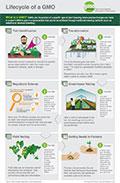Question
What are the plans for the future of GMOs? Will all crops be GE eventually?
Submitted by: JamieR
Answer
Expert response from Steve Savage
Consultant, Savage & Associates
Tuesday, 16/12/2014 00:44
It is difficult to predict the answer to this question. Originally, it looked like only major crops (e.g., corn, soy, cotton ...) would have GE traits, because the process of research, development and regulation was so expensive that the investment could not be justified for most crops. That cost barrier has been coming down because of newer and better tools — most of which were developed for the extensive medical and industrial applications of genetic engineering. There are now examples of engineered crops approaching commercialization for smaller, "specialty crops," like oranges, tomatoes, potatoes and apples. These have also been developed by much smaller companies or in university settings with funding from farmer groups. Examples of crops engineered for the benefit of farmers in the developing world have been developed by government entities and/or nonprofits. There are some very exciting new tools for "genome editing" that could make the process even faster and less costly. Many of the original patents for biotech methods are expiring, and that will open the door to additional players. So, from a technology standpoint, there is much potential for more GE crops.
It is difficult to predict whether these technologies will actually be commercialized or made available to farmers. Regulatory authorities in many countries (e.g., most of the EU) continue to block the use of these technologies, even though their own scientific assessments support the safety of the technology and even though their own farmers would like to be able to get the benefits. Regulators in the developing world have often been influenced by pressure from anti-GMO activists, so very few GE crop traits have come into use for poor farmers.
Also, major players in the rich world food system (such as processors, food manufacturers and retailers) are worried about the brand risk they would face if high-profile crops became "GMO" and thus subject to activist protests. Often, such companies have enough leverage in their supply chains to effectively block GE crop commercialization. These players are already under intense pressure from activist groups to use that leverage. Sometimes growers are concerned about the damage that could happen to their crop's overall "brand" because of the predictable attacks that will come and the efforts to frighten consumers.
What happens with some current examples will do much to determine whether GE crop options begin to broaden or whether they will continue to be limited mainly to a few very large crops. Will the Florida orange industry get to implement GE technology that has the potential to keep it from being destroyed by a new, exotic bacterial disease? Will consumers get the option of buying an apple that does not brown and lose vitamins after cutting? Will potato farmers get to grow potatoes that have been improved with a disease-resistance gene moved from near-wild potatoes in the Andes? Will they be able to reduce the food waste that comes from bruising or from sugar accumulation in storage?
So, to come back to the question, will most crops eventually be GE? From a technology, patent and cost perspective, the answer is yes. However, because of the continued role of non-science-based regulation and the power of threats to brands, it is quite possible that the answer is no.
GMO Innovation Contest Recap!
